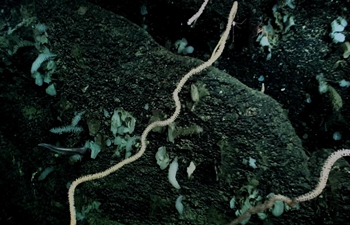WASHINGTON, May 18 (Xinhua) -- American researchers have developed a remedy to thwart a protein that helps the metastatic spread of breast cancer, a leading cause of death for women.
A study published on Friday in the journal Nature Communications revealed that by inhibiting a protein called TAK1 via a tiny sac, the lung metastases in mice with triple-negative breast cancer can be reduced.
The triple-negative breast cancer (TNBC) is a deadliest type of breast cancer, comprising 20 percent of breast cancer cases. It is estrogen receptor-negative, progesterone receptor-negative and HER2-negative, meaning it is resistant to all the three effective breast cancer targets.
"For this subtype of breast cancer, few treatment options are available to target metastasis," said Yu Min, an assistant professor of stem cell biology and regenerative medicine at the University of South Carolina.
According to the study, TAK1 enables malignant cells from the breast to survive in the lungs and form new metastatic tumors. Metastases are the most common cause of cancer-related death.
There was previously a potential drug, called 5Z-7-Oxozeaenol or OXO, that can inhibit TAK1 and presumably make it much more difficult for breast cancer cells to form lung metastases.
However, OXO is not stable in the blood, and therefore wouldn't work in patients.
Yu and her colleague at the university's school of engineering developed a nanoparticle, consisting of a tiny fatty sac, which works like a smart bomb to carry drugs through the bloodstream and deliver them directly to tumors.
The scientists loaded this nanoparticle with OXO, and used it to treat mice that had been injected with human breast cancer cells.
While OXO did not shrink primary tumors in the breast, it greatly reduced metastatic tumors in the lungs with minimal toxic side effects.
"For patients with triple-negative breast cancer, systemic chemotherapies are largely ineffective and highly toxic," Yu said. "So nanoparticles are a promising approach for delivering more targeted treatments, such as OXO, to stop the deadly process of metastasis."
The research is in early-stage development using animal tests. The method the researchers discovered shows promise, but more research will be needed before it could be applied to humans for treatment.

















